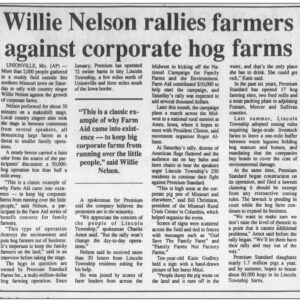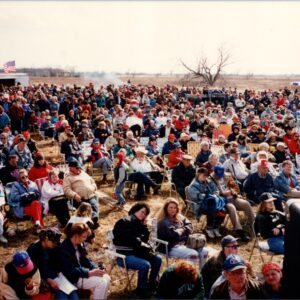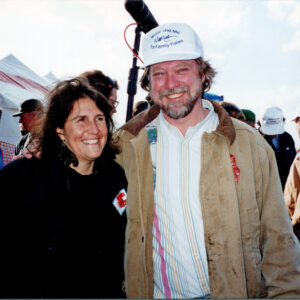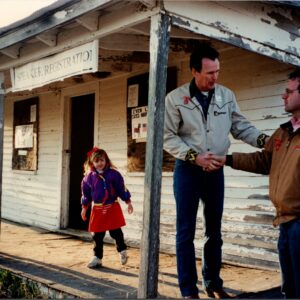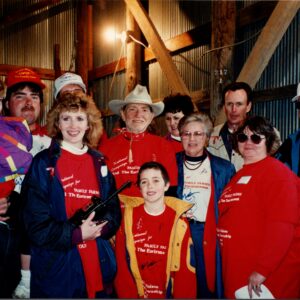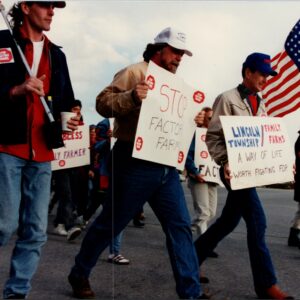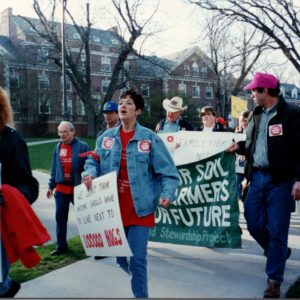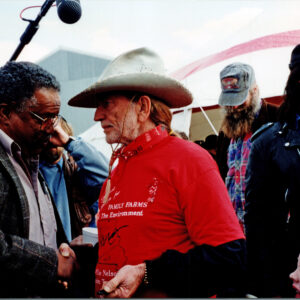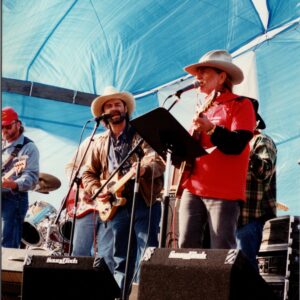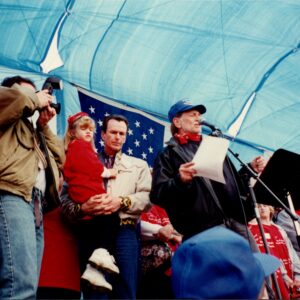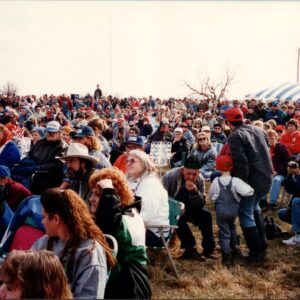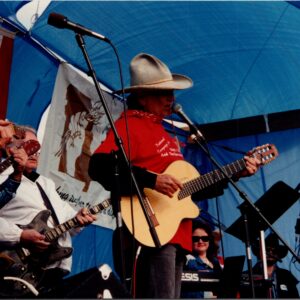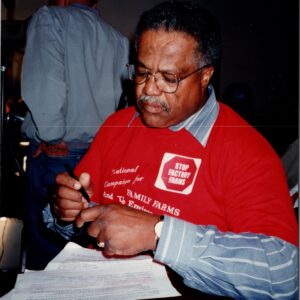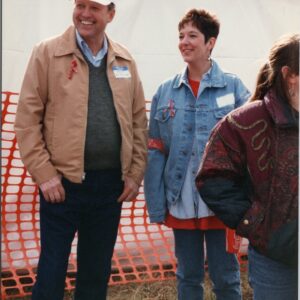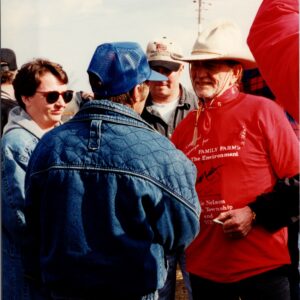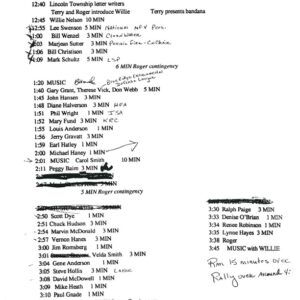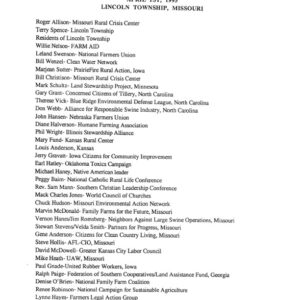As Farm Aid’s 40th anniversary approaches this September, we want to take the opportunity to look back at some significant historical events in the history of the family farm movement. As it happens, this week marks the 30th anniversary of the first major protest against factory farms in Lincoln Township, Missouri. Organized by the Missouri Rural Crisis Center‘s Roger Allison, Rhonda Perry, and Terry Spence, the rally brought Farm Aid president Willie Nelson to a remote crossroads in the northern part of the state, the national media followed, and a movement for family farms and the environment was born.
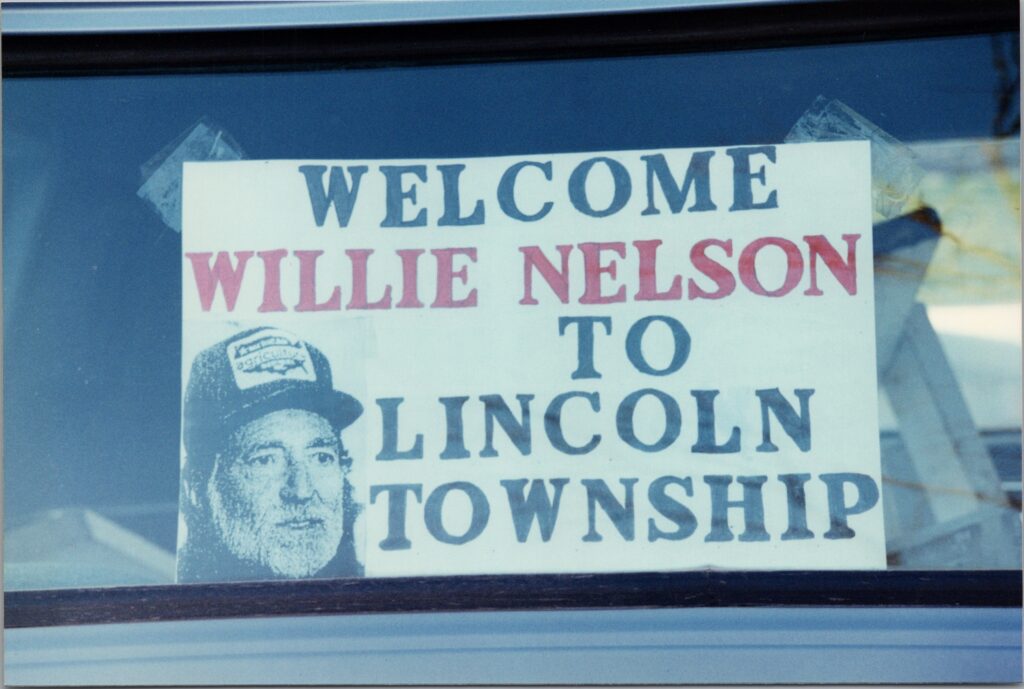
Photo © Farm Aid
The trouble in Lincoln Township began in the early 1990s, when the Missouri state legislature rolled over for Premium Standard Farms (PSF), a company following the “Tyson model” of vertical integration – controlling every aspect of pork production and distribution “from piglet to pork chop.” The company targeted Missouri, in particular, because of weak environmental regulations and the ease with which it could buy legislative allies through campaign contributions. In fact, PSF had turned its attention to Missouri after the state of Iowa thwarted the company’s attempts to construct a factory farm near a state park without securing legally required permits from the Iowa Department of Natural Resources. PSF’s subsequent Missouri strategy paid off when, in late 1993, the state legislature exempted three counties – Putnam, Sullivan, and Mercer – from the state’s Anti-Corporate Farming Law of 1975; not coincidentally, PSF had plans to build additional enormous hog factory farms in those three counties.
“Farm Aid will continue to stand with farmers and rural residents whenever their future is threatened.” — Willie Nelson
In Lincoln Township, a small community of 200 people in Putnam County started to organize when they learned of PSF’s plans to build a complex of ninety-six buildings to house 106,000 sows. An operation of that size, with sows projected to produce up to 2.5 million hogs per year, required twelve open “lagoons” designed to hold 25,000 gallons of sewage – sewage that would be applied and overapplied to land surrounding the operation, polluting local water and producing an airborne stench that would destroy the quality of life (not to mention property values) and threaten the health of families in at least thirty households within a one-mile radius of the proposed factory farm.
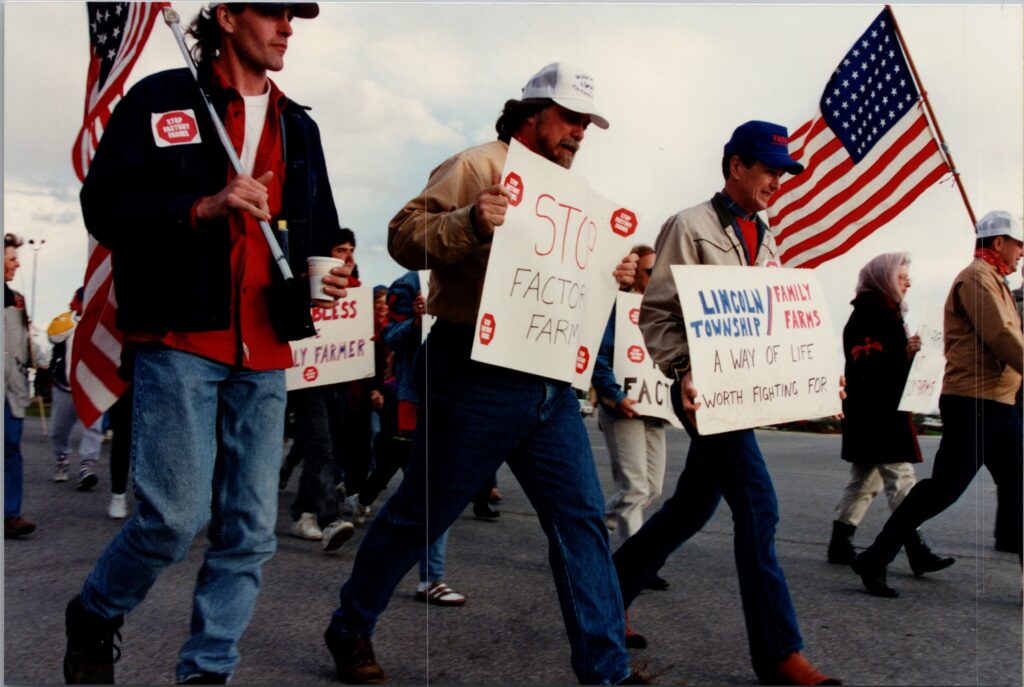
“Lincoln Township / Family Farms: A way of life worth fighting for.” Photo © Farm Aid
Consequently, in the summer of 1994, the people of Lincoln Township voted to adopt a Comprehensive Planning and Zoning Ordinance. The new law prohibited the construction of Concentrated Animal Feeding Operations (CAFOs) if they did not meet requirements for setbacks from existing residences and waterways and if they did not include a security bond that would hold the company liable for any cleanup of the CAFO in the event that the operation shut down.
Within a matter of days, Premium Standard Farms tried to steamroll the will of the people by moving forward with the construction of the CAFO, in direct violation of the new ordinance. When the company received formal notification of the code violation, it turned around and sued Lincoln Township for $7.9 million, claiming that the municipality’s new zoning law violated the company’s property rights. The suit could only be characterized as an effort to bully the local government, but the company underestimated the resolve of the people of Lincoln Township. They filed a counterclaim against PSF to stop the construction of the facility for violating the county’s zoning ordinance and for being a public nuisance.
Here is where Farm Aid got involved. Working with Roger Allison, Rhonda Perry and others at the Missouri Rural Crisis Center – a local family farm organization and one of Farm Aid’s closest partner organizations, also founded in 1985 – Farm Aid program director Harry Smith organized a rally for April 1, 1995. After receiving more than twenty letters from residents of Lincoln Township, describing their struggle, Farm Aid president Willie Nelson pledged to come to the rally himself. “The residents of small towns deserve respect, and family farmers should not be forced from their land” by an enormous, encroaching factory farm, Willie said in a statement. “Farm Aid will continue to stand with farmers and rural residents whenever their future is threatened.” When Premium Standard Farms learned of the rally and of Willie’s involvement, the company dropped the monetary damages portion of its lawsuit against Lincoln Township.
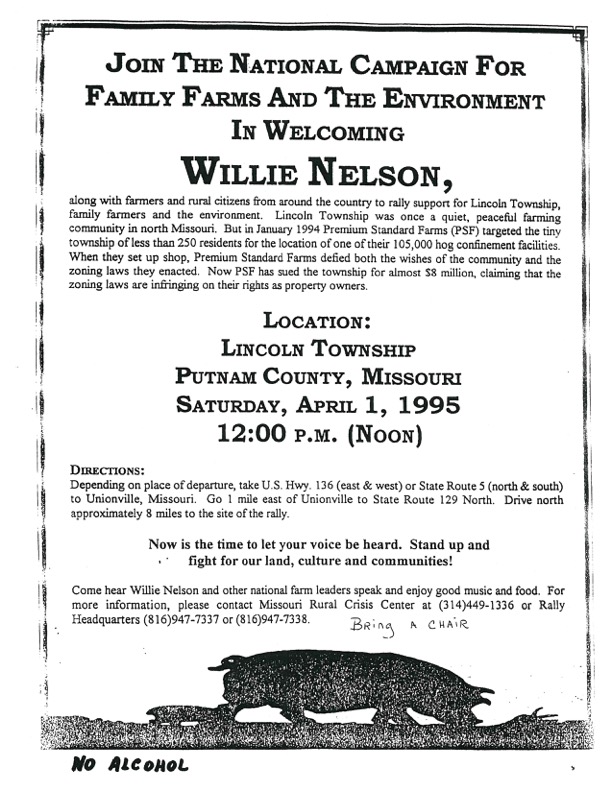
“Now is the time to let your voice be heard. Stand up and fight for our land, culture and communities!”
On a cold April 1st morning, following a snowstorm, more than 3,800 people – including farm organization leaders from all over the country – trudged through the mud to participate in a rally that marked the launch of the Campaign for Family Farms and the Environment (CFFE). MRCC, Iowa Citizens for Community Improvement and the Land Stewardship Project started CFFE as a way to bring together rural people facing the same threats to their communities in the Midwest. But so many others came: Representatives of the Federation of Southern Cooperatives, the United Autoworkers, the National Farmers Union and the Humane Farming Association – to name just a few – gathered at an intersection of two gravel roads, maybe 150 miles from any interstate to rally, to hear statements from leaders from all over the country and to listen to Willie Nelson.
“This type of operation destroys the environment and puts hog farmers out of business,” Willie said of the PSF factory farm in the distance in an interview just before taking the stage. “It’s important to keep the family farmers on the land.” Moments later, when Willie stepped to the microphone, he looked out past the crowd at the rows of metal-sided buildings making up the PSF factory farm. “It appears that the aliens have landed,” he said.
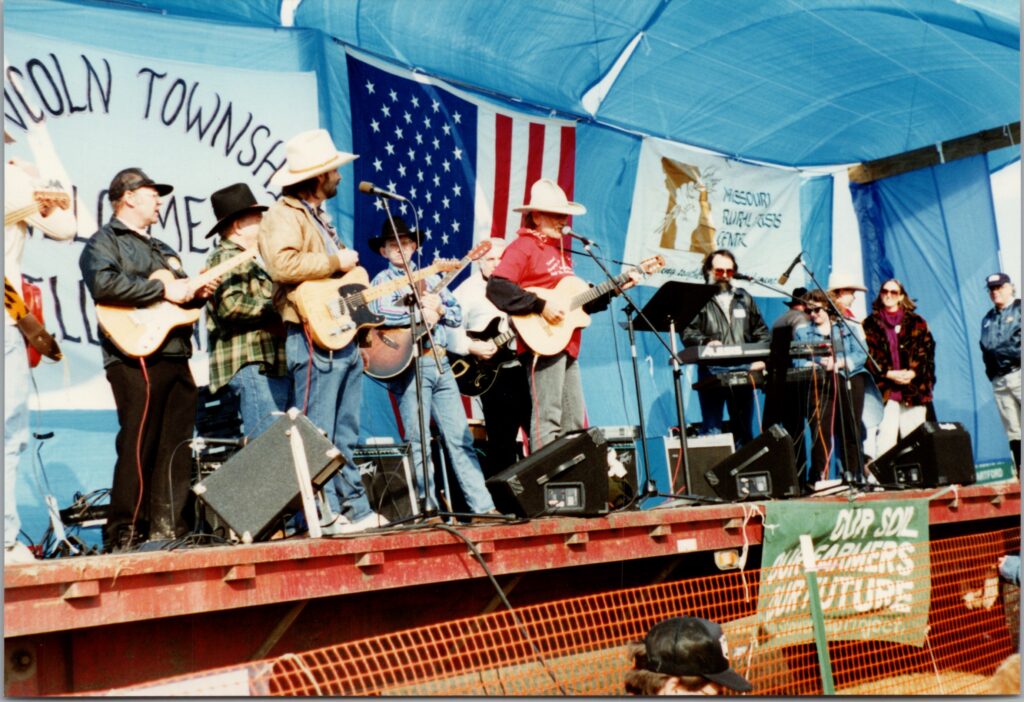
Willie Nelson performs. Photo © Farm Aid
More seriously, Willie went on to say that “this is what Farm Aid is all about: stopping the big corporate guys from running over the little guys.” As Roger Allison later recounted, “the crowd went absolutely wild when Willie said that.” Willie’s appearance in Lincoln Township not only brought national attention to the fight against factory farms, but it showed people in the region that they were not alone. “When people get the crap kicked out of them over and over, sometimes it’s a little hard for them to get up in the morning,” Allison later said. “But then you have Willie. He drives up from Texas to show his support, and people see that and say, ‘By gosh, there is hope, because we have friends in high places,’ and by that I mean Willie Nelson and Farm Aid. It just renewed people’s spirits to fight back for economic, social, and environmental justice.”
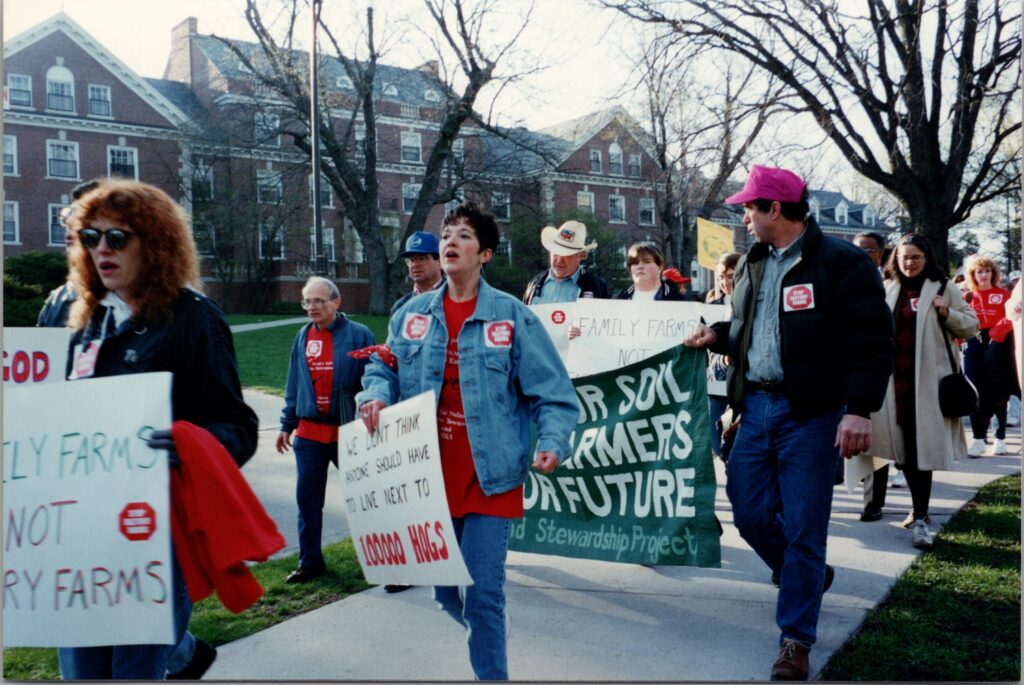
Rhonda Perry of the Missouri Rural Crisis Center in the center, along with other marchers. Photo © Farm Aid
Inspired by the day’s events and the coverage that followed, CFFE organized a “Journey for Justice” march from Lincoln Township to Ames, Iowa, a few weeks later. Organizers chose Ames because they wanted to meet with President Bill Clinton and Secretary of Agriculture Dan Glickman, who were attending the National Rural Conference. The march of nearly 200 miles took six days and gathered Midwestern farmers along the way. In Ames, 150 people rallied outside the conference while a few delegates met with President Clinton and Secretary Glickman.
Eventually, Glickman met with organizers in Washington, D.C., and, in November, he traveled to Lincoln Township to meet with nearly 300 farmers and organizers who traveled from Iowa, Minnesota, Wisconsin, Illinois, Kansas and North Carolina inside a machine shed the day after an ice storm. There, in that machine shed, farmers demanded enforcement of the antitrust provisions of the Packers and Stockyards Act; they demanded enforcement of environmental regulations aimed at keeping the air and water clean; and they demanded that the Clinton administration stop using taxpayer dollars to provide guaranteed loans to fund CAFOs.
The administration agreed to stop the guaranteed loan program for CAFOs, but the Missouri State Supreme Court subsequently ruled against Lincoln Township, saying that under state law, agricultural buildings, structures and water impoundments were exempt from zoning.
The farmers and rural citizens in Lincoln Township who stood up to Premium Standard Farms and launched a national movement against factory farms were not career activists or organizers. They were regular people who mobilized, like anyone would, when faced with a giant corporation, aided and abetted by craven public officials, putting corporate profits ahead of the health and well-being of communities. The Lincoln Township episode was just the start of the family farm fight against the industrial, corporate takeover of the U.S. livestock industry, and the people sent a clear message to the industry that they were in for a fight. Over the years, CFFE has stopped thousands of other factory farms from being built, and Farm Aid has been proud to support that campaign.

